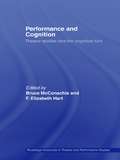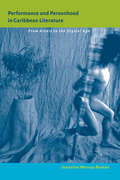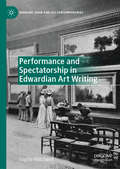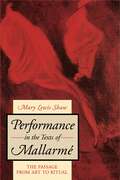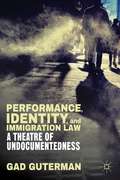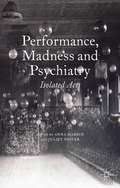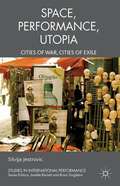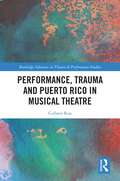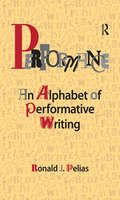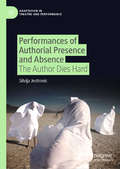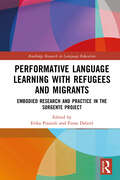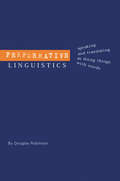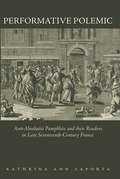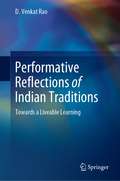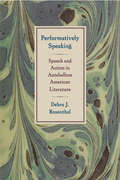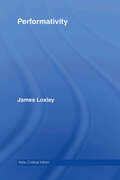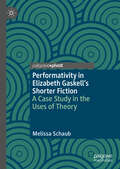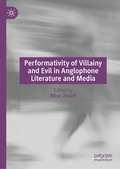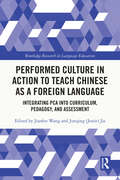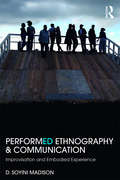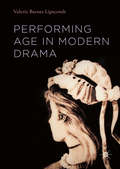- Table View
- List View
Performance and Cognition: Theatre Studies and the Cognitive Turn (Routledge Advances in Theatre & Performance Studies)
by Bruce McConachie F. Elizabeth HartThis anthology is the first of its kind. In addition to opening up fresh perspectives on theatre studies – with applications for dramatic criticism, performance analysis, acting practice, audience response, theatre history, and other important areas – the book sets the agenda for future work, helping to map the emergence of this new approach. Following a comprehensive introduction, the contributors examine: the interfaces between cognitive studies and Lacanian psychoanalysis, phenomenology and communication theory different ideas from cognitive studies that open up the meanings of several plays the process of acting and the work of Antonio Damasio theatrical response: the dynamics of perception, and the riots that greeted the 1907 production of The Playboy of the Western World. This original and authoritative work will be attractive to scholars and graduate students of drama, theatre, and performance.
Performance and Culture in Plato's Laws
by Anastasia-Erasmia PeponiThis volume is dedicated to an intriguing Platonic work, the Laws. Probably the last dialogue Plato wrote, the Laws represents the philosopher's most fully developed views on many crucial questions that he had raised in earlier works. Yet it remains a largely unread and underexplored dialogue. Abounding in unique and valuable references to dance and music, customs and norms, the Laws seems to suggest a comprehensive model of culture for the entire polis - something unparalleled in Plato. This exceptionally rich discussion of cultural matters in the Laws requires the scrutiny of scholars whose expertise resides beyond the boundaries of pure philosophical inquiry. The volume offers contributions by fourteen scholars who work in the broader areas of literary, cultural, and performance studies.
Performance and Identity in the Classical World
by Anne DuncanActors in the classical world were often viewed as frauds and impostors, capable of deliberately fabricating their identities. Conversely, they were sometimes viewed as possessed by the characters that they played, or as merely playing themselves onstage. Numerous sources reveal an uneasy fascination with actors and acting, from the writings of elite intellectuals (philosophers, orators, biographers, historians) to the abundant theatrical anecdotes that can be read as a body of "popular performance theory. " This study examines these sources, along with dramatic texts and addresses the issue of impersonation, from the late fifth century BCE to the early Roman Empire.
Performance and Personhood in Caribbean Literature: From Alexis to the Digital Age (New World Studies)
by Jeannine Murray-RománFocusing on the literary representation of performance practices in anglophone, francophone, and hispanophone Caribbean literature, Jeannine Murray-Román shows how a shared regional aesthetic emerges from the descriptions of music, dance, and oral storytelling events. Because the historical circumstances that led to the development of performance traditions supersede the geopolitical and linguistic divisions of colonialism, the literary uses of these traditions resonate across the linguistic boundaries of the region. The author thus identifies the aesthetic that emerges from the act of writing about live arts and moving bodies as a practice that is grounded in the historically, geographically, and culturally specific features of the Caribbean itself. Working with twentieth- and twenty-first-century sources ranging from theatrical works and novels to blogs, Murray-Román examines the ways in which writers such as Jacques Stephen Alexis, Zoé Valdés, Rosario Ferré, Patrick Chamoiseau, and Marlon James experiment with textually compensating for the loss of the corporeality of live relationship in performance traditions. Through their exploration of the interaction of literature and performance, she argues, Caribbean writers themselves offer a mode of bridging the disjunction between cultural and philosophical approaches within Caribbean studies.
Performance and Spectatorship in Edwardian Art Writing (Bernard Shaw and His Contemporaries)
by Sophie HatchwellThis book explores how Edwardian art writing shaped and narrated embodied, performative forms of aesthetic spectatorship. It argues that we need to expand the range of texts we think of as art writing, and features a diverse array of critical and fictional works, often including texts that are otherwise absent from art-historical study. Multi-disciplinary in scope, this book proposes a methodology for analyzing the aesthetic encounter within and through art writing, adapting and reworking a form of phenomenological-semiotic analysis found conventionally in performance studies. It focuses on moments where theories of spectatorship meet practice, moving between the varied spaces of Edwardian art viewing, from the critical text, to the lecture hall, the West End theatre and gallery, middle-class home, and fictional novel. It contributes to a rethinking of Edwardian culture by exploring the intriguing heterogeneity and self-consciousness of viewing practices in a period more commonly associated with the emergence of formalism.
Performance in the Texts of Mallarmé: The Passage from Art to Ritual
by Mary Lewis ShawPerformance in the Texts of Mallarmé offers a new theory of performance in the poetic and critical texts of Stephane Mallarmé, a theory challenging the prevailing interpretation of his work as epitomizing literary purism and art for art's sake.Following an analytical presentation of the concepts of ritual and performance generally applied, Mary Shaw shows that Mallarmé perceived music, dance, and theater as ideal languages of the body and therefore as ideal forms of ritual through which to supplement and celebrate poetic texts. She focuses on previously unexplored references to supplementary, extratextual performances in four of Mallarmé's major poetic texts—Herodiade, L'après-midi d'un faune, Igitur, and Un coup de des—revealing the consistent formal expression of his original conception of literature's relationship to the performing arts.Shaw then discusses Mallarmé's monumental project, Le Livre, a metaphysical book designed to be performed in a series of ritual celebrations. She analyzes and describes the intrinsic structure and contents of this unfinished work as the fullest realization of the text-performance relationship elaborated throughout Mallarmé's corpus. Shaw offers Le Livre as a prototype of avant-garde performance, drawing important parallels between Mallarmé's literary experimentation and crucial developments in twentieth-century arts.
Performance, Identity, and Immigration Law
by Gad GutermanHow has contemporary American theatre presented so-called undocumented immigrants? Placing theatre artists and their work within a context of on-going debate, Guterman shows how theatre fills an essential role in a critical conversation by exploring the powerful ways in which legal labels affect and change us.
Performance, Madness and Psychiatry
by Anna Harpin Juliet FosterThis exciting collection of essays explores the complex area of madness and performance. The book spans from the 18th century to the present and unearths the overlooked history of theatre and performance in, and about, psychiatric asylums and hospitals. The book will appeal to historians, social scientists, theatre scholars, and artists alike.
Performance, Space, Utopia
by Silvija JestrovicThe war in the Balkans that took place between 1991-1995 forms the context of this book. It has been variously viewed as ethnic strife, religious conflict, or civil war but seldom has it been described as a war against cities. Belgrade and Sarajevo offer a fascinating comparative case study, not only because the two cities belong to the same historical narrative of the breakdown of Yugoslavia, but because of the ways in which their various performances both complement and contradict one another. This book examines how performance and theatricality became modes of being and acting in the city, even strategies of physical and ethical survival; yet so often it is exile, both as marginalisation within and exodus from the city, that emerges as the defining consequence of living in Sarajevo or Belgrade in the 1990s.
Performance, Trauma and Puerto Rico in Musical Theatre (Routledge Advances in Theatre & Performance Studies)
by Colleen RuaThis study positions four musicals and their associated artists as mobilizers of defiant joy in relation to trauma and healing in Puerto Rico. The book argues that the historical trajectory of these musicals has formed a canon of works that have reiterated, resisted or transformed experiences of trauma through linguistic, ritual, and geographic interventions. These traumas may be disaster-related, migrant-related, colonial or patriarchal. Bilingualism and translation, ritual action, and geographic space engage moments of trauma (natural disaster, incarceration, death) and healing (community celebration, grieving, emancipation) in these works. The musicals considered are West Side Story (1957, 2009, 2019); The Capeman (1998); In the Heights (2008); and Hamilton (2015). Central to this argument is that each of the musicals discussed is tied to Puerto Rico, either through the representation of Puerto Rican characters and stories, or through the Puerto Rican positionality of its creators. The author moves beyond the musicals to consider Lin-Manuel Miranda as an embodied site of healing, that has been met with controversy, as well as posthurricane Maria relief efforts led by Miranda on the island and from a distance. In each of the works discussed, acts of belonging shape notions of survivorship and witness. This book also opens a dialogue between these musicals and the work of island-based artists Y no había luz, that has served as sites of first response to disaster. This book will be of interest to students and scholars in Latinx Theatre, Musical Theatre and Translation studies.
Performance: An Alphabet of Performative Writing
by Ronald J PeliasPerformance uses the alphabet as an organizational device to present a series of short pieces that approach performance from multiple perspectives and various compositional strategies. Pelias’s essays, poetry, dialogue, personal narratives, quick speculations, and other literary genres explore the key themes in this field, encapsulating the essence of performance studies for the novice and providing food for thought for the expert. Its brief, evocative, and reflexive pieces introduce performative writing as a method of research for those in performance and many other fields.
Performances at Court in the Age of Shakespeare
by Sophie Chiari John MuccioloEven though Shakespeare openly dramatizes aristocratic shows in his own plays, the circumstances of early modern performance at court have received relatively little critical attention. With so much written on the playwright's wide and multi-layered audiences, the entertainment of the court itself has too long been dismissed as a secondary issue. This book aims to shed fresh light on the multiple aspects of Shakespearean performances at the Elizabethan and early Stuart courts, considering all forms of drama, music, dance and other entertainment. Taking the specific scenic environment and material conditions of early modern performance into account, the chapters examine both real and dramatized court shows in order to break ground for new avenues of thought. The volume considers how early modern court shows shaped dramatic writing and what they tell us of the aesthetics and politics of the Tudor and Stuart regimes.
Performances of Authorial Presence and Absence: The Author Dies Hard (Adaptation in Theatre and Performance)
by Silvija JestrovicThis book takes Roland Barthes’s famous proclamation of ‘The Death of the Author’ as a starting point to investigate concepts of authorial presence and absence on various levels of text and performance. By offering a new understanding of ‘the author’ as neither a source of unquestioned authority nor an obsolete construct, but rather as a performative figure, the book illuminates wide-ranging aesthetic and political aspects of ‘authorial death’ by asking: how is the author constructed through cultural and political imaginaries and erasures, intertextual and intertheatrical references, re-performances and self-referentiality? And what are the politics and ethics of these constructions?
Performative Language Learning with Refugees and Migrants: Embodied Research and Practice in the Sorgente Project (Routledge Research in Language Education)
by Erika Piazzoli Fiona DalzielThis book investigates the use of performative language pedagogy in working with refugees and migrants, exploring performative language teaching as the application of drama, music, dance and storytelling to second language acquisition.Documenting a community-based project – funded by the Irish Research Council and conducted with three groups of refugees and migrants in Ireland and Italy – the book explores the methodological, pedagogical and ethical elements of performative language learning in the context of migration. Written by a team of arts-based researchers and practitioners, chapters discuss findings from the project that relate to factors such as embodied research methods, a motivation to belong and the ethical imagination, while exhibiting how performative language pedagogy can be effective in supporting children and adults in a range of challenging contexts.Offering a poetic and pictorial representation of the Sorgente Project, this book will be of interest to postgraduate students, researchers and academics in the fields of English language arts and literacy education, drama in education, the sociology of education and second language acquisition more broadly. Those working in refugee and migrant studies, and teacher education studies will also find the volume of use.
Performative Linguistics: Speaking and Translating as Doing Things with Words
by Douglas RobinsonIn this book, Douglas Robinson introduces a new distinction between 'constative' and 'performative' linguistics, arguing that Austin's distinction can be used to understand linguistic methodologies. Constative linguistics, Robinson suggests, includes methodologies aimed at 'freezing' language as an abstract sign system, while performative linguistics explores how language is used or 'performed' in those speech situations. Robinson then tests his hypothesis on the act of translation.Drawing on a range of language scholars and theorists, Performative Linguistics consolidates the many disparate action-approaches to language into a new paradigm for the study of language.
Performative Polemic: Anti-Absolutist Pamphlets and their Readers in Late Seventeenth-Century France (The Early Modern Exchange)
by Kathrina Ann LaPortaPerformative Polemic is the first literary historical study to analyze the “war of words” unleashed in the pamphlets denouncing Louis XIV’s absolute monarchy between 1667 and 1715. As conflict erupted between the French ruler and his political enemies, pamphlet writers across Europe penned scathing assaults on the his bellicose impulses and expansionist policies. This book investigates how pamphlet writers challenged the monarchy’s monopoly over the performance of sovereignty by contesting the very mechanisms through which the crown legitimized its authority at home and abroad. Author Kathrina LaPorta offers a new conceptual framework for reading pamphlets as political interventions, asserting that an analysis of the pamphlet’s form is crucial to understanding how pamphleteers seduced readers by capitalizing on existing markets in literature, legal writing, and journalism. Pamphlet writers appealed to the theater-going public that would have been attending plays by Molière and Racine, as well as to readers of historical novels and periodicals. Pamphleteers entertained readers as they attacked the performative circuitry behind the curtain of monarchy.
Performative Reflections of Indian Traditions: Towards a Liveable Learning
by D. Venkat RaoThis book focuses on the cohering elements across various texts and traditions of India. It engages with several significant works from the Sanskrit tradition and emphasizes the need to move beyond colonial and postcolonial engagements with the enduring cultural pasts of India. The chapters are grouped in three main parts: accented rhythms, dispersed mnemoscapes and inventive iterations. It addresses questions such as: what enabled cultural communication across very divergent geographical, temporal, locational contexts and among different cultural formations of India over millennia? What is this shareable impulse that pulsates across the domains of dance, sculpture, painting, poetry, dharma, music, medicine, the lore of rivers and the epics? It explains how modern Indian languages and especially their creative and reflective nodes are unthinkable without the intricately woven textures of these interfaces and their responsive receptions. This book is of interest to philosophers, humanities students, researchers and professors as well as people interested in exploring alternatives to European traditions of thought without an alibi.
Performatively Speaking: Speech and Action in Antebellum American Literature
by Debra J. RosenthalIn Performatively Speaking, Debra Rosenthal draws on speech act theory to open up the current critical conversation about antebellum American fiction and culture and to explore what happens when writers use words not just to represent action but to constitute action itself. Examining moments of discursive action in a range of canonical and noncanonical works--T. S. Arthur's temperance tales, Fanny Fern's Ruth Hall, Nathaniel Hawthorne's The Scarlet Letter, Harriet Beecher Stowe's Uncle Tom's Cabin, and Herman Melville's Moby-Dick--she shows how words act when writers no longer hold to a difference between writing and doing. The author investigates, for example, the voluntary self-binding nature of a promise, the formulaic but transformative temperance pledge, the power of Ruth Hall's signature or name on legal documents, the punitive hate speech of Hester Prynne's scarlet letter A, the prohibitory vodun hex of Simon Legree's slave Cassy, and Captain Ahab's injurious insults to second mate Stubb. Through her comparative methodology and historicist and feminist readings, Rosenthal asks readers to rethink the ways that speech and action intersect.
Performativity (The New Critical Idiom)
by James LoxleyDo our writings and our utterances reflect or describe our world, or do they intervene in it? Do they, perhaps, help to make it? If so, how? Within what limits, and with what implications? Contemporary theorists have considered the ways in which the languages we speak might be ‘performative’ in just this way, and their thinking on the topic has had an important impact on a broad range of academic disciplines. In this accessible introduction to a sometimes complex field, James Loxley: offers a concise and original account of critical debates around the idea of performativity traces the history of the concept through the work of such influential theorists as J. L. Austin, John Searle, Stanley Fish, Jacques Derrida, Paul de Man and Judith Butler examines the implications of performativity for fields such as literary and cultural theory, philosophy, performance studies, and the theory of gender and sexuality. emphasises the political and ethical implications that its most important theorists have drawn from the notion of performativity suggests ways in which major debates around the topic have obscured its alternative interpretations and uses. For students trying to make sense of performativity and related concepts such as the speech act, ‘ordinary language’, and iterability, and for those seeking to understand the place of these ideas in contemporary performance theory, this clear guide will prove indispensable. Performativity offers not only a path through challenging critical terrain, but a new understanding of just what is at stake in the exploration of this field.
Performativity in Elizabeth Gaskell’s Shorter Fiction: A Case Study in the Uses of Theory
by Melissa SchaubThis book simultaneously examines the specific theoretical issues raised by Elizabeth Gaskell’s use of characterization in her shorter fiction, and addresses the larger question of how literary critics ought to use theory. The text gives a history of Judith Butler’s theory of performativity and the uptake of that theory in literary criticism, and also provides detailed close reading of Gaskell’s fiction—both frequently examined texts like Cranford, Mary Barton, and Wives and Daughters, and some that are less often studied, such as “Lizzie Leigh” and Cousin Phillis. The book argues that as theory becomes naturalized into the vocabulary of literary scholars, it often becomes more optimistic and less specific. In discussing the naturalization of theory exemplified by the application of performativity to Gaskell, the book advances general principles on the use of theory. It can be read as scholarship or used as a textbook in literary methods courses.
Performativity of Villainy and Evil in Anglophone Literature and Media
by Nizar ZouidiPerformativity of Villainy and Evil in Anglophone Literature and Media studies the performative nature of evil characters, acts and emotions across intersecting genres, disciplines and historical eras. This collection brings together scholars and artists with different institutional standings, cultural backgrounds and (inter)disciplinary interests with the aim of energizing the ongoing discussion of the generic and thematic issues related to the representation of villainy and evil in literature and media. The volume covers medieval literature to contemporary literature and also examines important aspects of evil in literature such as social and political identity, the gothic and systemic evil practices. In addition to literature, the book considers examples of villainy in film, TV and media, revealing that performance, performative control and maneuverability are the common characteristics of villains across the different literary and filmic genres and eras studied in the volume.
Performed Culture in Action to Teach Chinese as a Foreign Language: Integrating PCA into Curriculum, Pedagogy, and Assessment (Routledge Research in Language Education)
by Jianfen Wang Junqing Jessie JiaThis volume explores best practice in implementing the Performed Culture Approach (PCA) in teaching Chinese as a foreign language (CFL). Offering a range of chapters which demonstrate how PCA has been successfully applied to curriculum, instructional design, and assessment in CFL programs and classrooms at various levels, this text shows how PCA’s culture-focused paradigm differs fundamentally from the general communicative language teaching (CLT) framework and highlights how it can inspire innovative methods to better support learners’ ability to navigate target culture and overcome communication barriers. Additional applications of PCA in the development of learner identity, intercultural competence, autonomy, and motivation are also considered. Bridging theoretical innovations and the practice of curriculum design and implementation, this work will be of value to researchers, teacher trainers, and graduate students interested in Chinese teaching and learning, and especially those with interest in incorporating performance into foreign language curriculums with the goal of integrating language and culture.
Performed Culture in Action to Teach Chinese as a Foreign Language: Integrating PCA into Curriculum, Pedagogy, and Assessment (Routledge Research in Language Education)
by Jianfen Wang Junqing Jessie JiaThis volume explores best practices in implementing the Performed Culture Approach (PCA) in teaching Chinese as a foreign language (CFL).Offering a range of chapters that demonstrate how PCA has been successfully applied to curriculum, instructional design, and assessment in CFL programs and classrooms at various levels, this text shows how PCA’s culture-focused paradigm differs fundamentally from the general communicative language teaching (CLT) framework and highlights how it can inspire innovative methods to better support learners’ ability to navigate target culture and overcome communication barriers. Additional applications of PCA in the development of learner identity, intercultural competence, autonomy, and motivation are also considered.Bridging theoretical innovations and the practice of curriculum design and implementation, this work will be of value to researchers, teacher trainers, and graduate students interested in Chinese teaching and learning, especially those with an interest in incorporating performance into foreign language curriculums with the goal of integrating language and culture.
Performed Ethnography and Communication: Improvisation and Embodied Experience
by D Soyini MadisonPerformed Ethnography and Communication explores the relationships between these three key terms, addressing the impact of ethnography and communication on the cutting edge of performance studies. Ranging from digital performance, improvisation and the body, to fieldwork and staged collaboration, this volume is divided into two main sections: "Embodied technique and practice," which addresses improvisation, devised theatre-making, and body work to consider what makes bodies move, sound, behave, mean, or appear differently, and the effects of these differences on performance; "Oral history and personal narrative performance," which is concerned with the ways personal stories and histories might be transformed into public events, looking at questions of perspective, ownership, and reception. Including specific historical and theoretical case studies, exercises and activities, and practical applications for improvisation, ethnography, and devised and digital performance, Performed Ethnography and Communication represents an invaluable resource for today’s student of performance studies, communication studies or cultural studies.
Performing Age in Modern Drama
by Valerie Barnes Barnes LipscombThis book is the first to examine age across the modern and contemporary dramatic canon, from Arthur Miller and Tennessee Williams to Paula Vogel and Doug Wright. All ages across the life course are interpreted as performance and performative both on page and on stage, including professional productions and senior-theatre groups. The common admonition "act your age" provides the springboard for this study, which rests on the premise that age is performative in nature, and that issues of age and performance crystallize in the theatre. Dramatic conventions include characters who change ages from one moment to the next, overtly demonstrating on stage the reiterated actions that create a performative illusion of stable age. Moreover, directors regularly cast actors in these plays against their chronological ages. Lipscomb contends that while the plays reflect varying attitudes toward performing age, as a whole they reveal a longing for an ageless self, a desire to present a consistent, unified identity. The works mirror prevailing social perceptions of the aging process as well as the tension between chronological age, physiological age, and cultural constructions of age.
